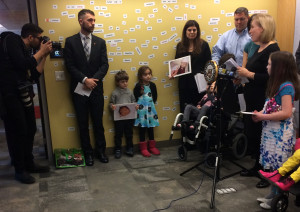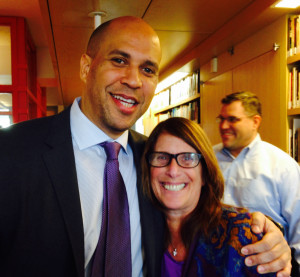Me and My Epilepsy – Mrs. Gotham City
My name is Alexandra DeBourcy and my epilepsy is a part of my life, my history and my future.
I was diagnosed with epilepsy at the age of five, when my parents noticed I was having “head tics.” Shortly after starting my epilepsy medication, I stopped experiencing myoclonic tics. As a 5 year-old, I did not understand the full extent of my diagnosis, but I recognized a change in my lifestyle. At that very young age, I had to swallow non-chewable prescription medication, undergo many boring diagnostic tests and take monthly blood tests. The blood tests were the worst. Even at five, I knew my epilepsy diagnosis was changing my life.
Despite years of living seizure-free, one day during class when I was in the 7th grade, I had my first ever grand-mal seizure. When I awoke, I was still in school, surrounded by working paramedics, as well as teachers and school administrators whose faces were filled with panic and fear. It took me a while to understand I had just had a seizure. At the time, I could only think about how my peers, who also witnessed my seizure, would judge me. Prior to returning to school, I called some of the students in class. It was easier to explain my epilepsy on a one-on-one basis. It helped. I don’t know if my phone calls helped any of my classmates, but it I do know it helped me. It gave me strength to face my schoolmates. I had more grand mal seizures in school during my adolescence, but I continued to open up and discuss my epilepsy with classmates and adults.
Luckily, I remained seizure free during high school and most of college, but my epilepsy was still a part of me. My parents and doctors reinforced the need for me to communicate my disorder to my friends, teachers and professors. No matter how long I went without a seizure, I had a different lifestyle than my peers. I was approaching the age where my actions, especially as a driver, had a greater effect on the lives of others. So, I continued to use communication, and levity, to introduce my epilepsy to other people.
After graduating from Syracuse University, I started having grand-mal seizures, again. This added additional considerations, as I was about to begin my career search. My epilepsy stabilized, and I moved to New York City. I loved New York City, and it had a public transportation system I could depend on. I was able to find work at an ad agency with an insurance plan. Since I had been denied a private insurance due to my pre-existing condition.
Unfortunately, I continued to experience seizures through out my twenties. I also experienced the Great Recession, the election of our first Black President, and falling in love with my husband. Eventually, my doctors and I decided to change medications. I had seizures at work. Some of my colleagues were empathetic; others were not. I sometimes felt stigmatized in my work environment. Due to privacy laws, it was hard for employers and colleagues to talk openly with me about my epilepsy.
Eventually, I left advertising. It was not the best career environment for my epilepsy. I decided to change careers and become a gemologist. My change in careers has allowed me to work in an environment more suitable for my epilepsy. I also work very happily with diamonds, gems and beautiful jewelry. It also has provided me with more time to devote to helping others with epilepsy. I now have the chance to represent the Epilepsy Foundation of Metropolitan New York as Mrs. Gotham City in the upcoming Mrs. New York America pageant.
I have had to accommodate my epilepsy throughout my entire life and, many times, I have resented my epilepsy. However, the happiest times in my life occurred when I worked with my epilepsy without shame. It is embarrassing to have a seizure in school or at work. It is awkward to tell peers about a personal neurological disorder. Furthermore, it is difficult to disguise EEG electrodes for three days straight. So, as an epileptic, I know I can empower myself by starting the conversation on my epilepsy. I want to continue and expand the conversation with others living and affected by epilepsy. It is the best way I know to keep myself safe and happy. We need to discuss new treatments, gather community support and take the stigma away from epilepsy.
EFMNY Joins Senators Gillibrand & Booker in Support of CARERS Act
“It was such a privilege to gather with New York & New Jersey families in NYC in support of the #CARERSAct legislation sponsored by Senator Kirsten Gillibrand, Senator Cory Booker, and Senator Rand Paul, which aims to reschedule cannabis to facilitate epilepsy research. The CARERS Act Bill will provide access to research, enabling families and their physicians to chose treatment options without fear of being in violation of federal law. It provides hope in the battle against seizures and we are deeply grateful to the bills sponsors.”
-Statement from Executive Director Pamela Conford of the Epilepsy Foundation of Metropolitan New York (EFMNY)

Senator Kirsten Gillibrand w/ NYC epilepsy advocate Paula Notari, mother of baby Emma Rose Mazurek, speaking to NY/ NJ families about the CARERS Act to Reschedule Cannabis
For full information on epilepsy and the CARERS Act, please read our blog post: http://epilepsynyc.com/2015/03/epilepsy-carers-act-reschedule-cannabis-marijuana-explained/

EFMNY Exc. Director Pamela and Senator Cory Booker in NYC supporting the #CARERSAct
Epilepsy and CARERS Act to Reschedule Cannabis Explained
What is the Compassionate Access and Research Expansion and Respect States (CARERS) Act to reschedule cannabis/ medical marijuana, and how does it relate to epilepsy?
The Compassionate Access and Research Expansion and Respect States (CARERS) Act
Medical Marijuana has been shown to alleviate symptoms of serious medical conditions including rare pediatric epileptic and seizure disorders, cancer, AIDS, and glaucoma.
Twenty-three states and the District of Columbia have passed medical marijuana laws legalizing the use of medical marijuana for qualifying patients under state law. However, the medical use of marijuana remains illegal under federal law. Even in states where medical marijuana laws exist, patients and providers are vulnerable to arrest and interference from federal law enforcement.
The bipartisan Compassionate Access and Research Expansion and Respect States (CARERS) Act would not penalize families from accessing prescribed medicine which ease the symptoms of these life threatening diseases by doing the following:
Ends the federal prohibition of medical marijuana under the federal Controlled Substances Act (CSA)
Marijuana is still illegal under any circumstances according to federal law. Physicians who prescribe marijuana for medical treatment in accordance with state law could still face federal prosecution for prescribing marijuana. The CARERS Act amends the CSA so that states can set their own medical marijuana policies. Individuals in states that take part in medical marijuana programs – patients, providers, businesses – will no longer be in violation of federal law.
Reschedules Marijuana from Schedule I to Schedule II
The Controlled Substances Act currently lists cannabis as a Schedule I drug. Schedule I drugs are those that have a high potential for abuse and has no currently accepted medical use in the United States. Cannabis’s classification as a Schedule I drug adds considerable complexity, expense, and potential access problems for clinical research. The CARERS Act moves marijuana from Schedule I to Schedule II. Under Schedule II the drug has a currently accepted medical use in treatment in the United States and may be prescribed by doctors on a limited basis.
Allow importation of Cannabidiol (CBD)
The CARERS Act would give children and adults with epilepsy and other seizure disorders access to the oil (called CBD) for treatment by removing CBD oil from the federal definition of marijuana in the Controlled Substances Act.
Banks to be allowed to do Business with Marijuana Dispensaries
Many banks do not provide financial services for state-authorized marijuana-related businesses because of fear of criminal penalties. This bill would provide legal immunity from federal criminal prosecution to banks and credit unions, their officers and employees that provide financial services to marijuana-related businesses that engage in activities pursuant to state law.
Research
The federal government retains strict controls over the use of marijuana for research purposes. Research expansion has been hindered by a complicated federal approval process and limited availability of research-grade marijuana. The CARERS Act removes unnecessary bureaucratic hurdles for researchers to gain government approval to carry out research on marijuana.
Access to Medical Marijuana for Veterans
VA doctors are currently prohibited from aiding patients seeking medical use of marijuana.The CARERS Act allows Department of Veterans Affairs doctors to recommend medical marijuana to military veterans suffering from serious injuries or chronic conditions like post-traumatic stress disorder, in states where it is legal.
=========================
For more information on how the Epilepsy Foundation of Metropolitan New York (EFMNY) is getting involved, please visit: http://efmny.org/events/
Take action! Urge your Senators to support the CARERS Act to facilitate research on cannabis and help the epilepsy community gain safe, legal access to this treatment option. For more information on this Epilepsy Foundation ACTION ALERT, and how you can get involved, please visit: http://capwiz.com/efa/issues/alert/?alertid=64207976
